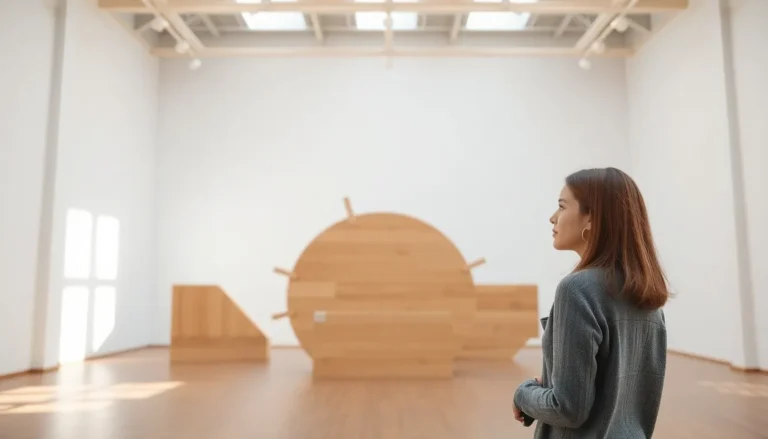Table of Contents
ToggleIn a world overflowing with distractions and endless to-do lists, minimalist routines offer a breath of fresh air. Imagine waking up to a life stripped of chaos, where simplicity reigns supreme and every task feels purposeful. It’s like decluttering your closet but for your daily grind—who wouldn’t want that?
What Are Minimalist Routines?
Minimalist routines focus on simplicity and intentionality in daily life. They eliminate distractions and prioritize essential tasks. Individuals engage in practices that promote mindfulness and reduce clutter, fostering a greater sense of peace and clarity.
Establishing a minimalist routine starts with identifying core values and goals. Those values guide daily decisions, ensuring that each action contributes to a meaningful life. Activities often involve tasks like meditation, journaling, or regular exercise, all aimed at enhancing well-being.
Adopting minimalist routines can also lead to improved time management. People often find that paring down commitments allows for deeper engagement in chosen activities. Essentials become the focal point, leading to enhanced productivity and satisfaction.
Individuals that embrace minimalist routines report feeling less overwhelmed by daily responsibilities. A streamlined approach allows for greater focus on what truly matters. Participants notice an increased ability to say no to distractions and yes to enriching experiences.
Creating a minimalist routine requires consistent effort and reflection. Tracking progress helps individuals align actions with aspirations. Each adjustment gradually transforms daily life into a more fulfilling experience.
By adopting minimalist routines, individuals foster intentional living and reduce mental clutter. The process cultivates a balanced lifestyle, leading to lasting positive changes in personal and professional realms.
Benefits of Minimalist Routines
Minimalist routines offer several advantages that enhance daily life. They create a more intentional existence, helping individuals focus on what truly matters.
Improved Focus and Productivity
A minimalist routine significantly boosts focus and productivity. Clarity arises when individuals prioritize essential tasks over distractions. Streamlined processes lead to better time management, enabling a more efficient workflow. Increased focus results in higher quality output, with individuals completing tasks faster and with greater accuracy. Studies show that a structured routine can enhance cognitive function, making it easier to maintain concentration during work. Incorporating practices like time blocking may further reinforce these positive effects. Regular reviews of priorities help ensure alignment with goals.
Reduced Stress and Anxiety
Reducing stress and anxiety becomes attainable through minimalist routines. Simplifying daily tasks allows individuals to eliminate overwhelm, creating a more peaceful mindset. Recognizing core values leads to decisions that align with personal priorities. As distractions diminish, mental clarity increases, contributing to emotional well-being. Harnessing techniques like mindfulness and meditation fosters resilience against stressors. Reports indicate that adopting a minimalist mindset results in lower anxiety levels, enabling individuals to cultivate a balanced life. With increased intention and focus, they navigate challenges with greater confidence and ease.
How to Create Your Own Minimalist Routine
Creating a minimalist routine starts with self-reflection and intentional decision-making. This approach streamlines daily actions to enhance productivity and satisfaction.
Assessing Your Current Routine
Individuals should take a moment to analyze their current routines. Recording daily activities helps identify time-wasting tasks. Observing patterns in productivity can reveal distractions. Participants often benefit from noting feelings associated with each task. Completing this assessment establishes a foundation for meaningful changes. Surveying commitments aids in recognizing what’s genuinely essential.
Choosing Essential Activities
Identifying core activities becomes the next crucial step. Listing tasks helps prioritize actions that align with personal values. Focusing on fewer responsibilities promotes deeper engagement. Selecting practices like exercise, meal prep, or hobbies encourages balance in life. Individuals should omit non-essential tasks to create space for what truly matters. Emphasizing quality over quantity leads to a more fulfilling routine.
Real-Life Examples of Minimalist Routines
Individuals often adopt minimalist routines to enhance their daily lives. A common example includes morning routines that prioritize mindfulness activities. Participants might wake up early, spend 10 minutes meditating, and then enjoy a simple breakfast with minimal distractions.
Another example features a workday structure focused on essential tasks. Professionals may choose to limit their to-do lists to no more than three critical tasks each day. They often set specific time blocks for deep work, allowing for uninterrupted focus that increases productivity and reduces stress.
In suburban environments, families implement minimalist routines in their evenings. They might designate specific nights for tech-free family dinners, encouraging connection without digital distractions. Streamlined activities like meal prep and simple household chores take precedence, leading to less overwhelm.
Additionally, students find success in minimalist study routines. By organizing their study environment and limiting study sessions to focused blocks of 30 minutes, they enhance retention and comprehension. Prioritizing breaks between sessions further contributes to maintaining high levels of concentration.
Some individuals integrate physical activity into their minimalist lifestyles through simple, consistent exercise routines. They may choose to jog or do yoga for just 20 minutes each day, focusing on quality rather than intensity. This practice not only improves physical health but also provides mental clarity.
These real-life examples demonstrate how embracing simplicity leads to meaningful engagement in daily activities. By prioritizing core values and essential tasks, people experience reduced stress, increased focus, and higher satisfaction in their lives.
Common Challenges and Solutions
Adopting minimalist routines often presents several challenges. Individuals may encounter difficulty when identifying essential tasks amidst distractions. To address this, keeping a journal for a week can help highlight time-wasting activities.
Overwhelm frequently arises when trying to simplify routines. Individuals might feel pressure to make sweeping changes immediately. Instead, gradually integrating one minimalist practice at a time promotes more sustainable changes.
Maintaining focus can prove challenging in a distraction-heavy environment. Technology, with its constant notifications, can disrupt attention. Setting specific times to check devices minimizes interruptions and fosters deeper engagement in essential tasks.
Inconsistency poses another obstacle, as individuals may struggle to stick with new routines. Establishing a system of accountability, such as sharing goals with a friend, can help maintain commitment.
Additionally, some may struggle with the concept of saying no. The fear of disappointing others can hinder prioritization of personal values. Practicing polite decline in non-essential commitments strengthens boundary-setting skills.
Lastly, emotional resistance often occurs as individuals adjust to minimalism. Attachment to possessions and habits can create reluctance to change. Emphasizing the benefits of a simplified life, such as reduced stress and increased clarity, can motivate individuals to push through these emotional barriers.
Implementing these strategies helps navigate common challenges associated with minimalist routines. Each solution aligns with the principles of intentional living, ultimately fostering a more balanced lifestyle.
Embracing minimalist routines can transform daily life into a more intentional and fulfilling experience. By prioritizing essential tasks and eliminating distractions, individuals can achieve greater clarity and focus. This shift not only enhances productivity but also fosters emotional well-being and reduces stress.
As individuals begin to simplify their routines, they often discover a deeper connection to their core values and goals. The journey towards minimalism may present challenges, but with patience and gradual changes, the benefits become evident. Ultimately, adopting a minimalist approach paves the way for a balanced lifestyle that prioritizes what truly matters, leading to lasting satisfaction in both personal and professional spheres.







